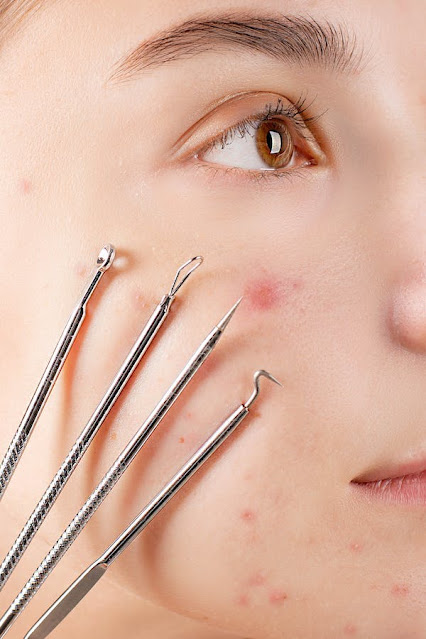Best Treatment for Acne
Description:
help you find the most effective treatment for your specific skin condition, ensuring better results and minimizing potential side effects.
• Avoid scarring or other damage to your skin
• Control your acne
• Make scars less noticeable
That's correct! Acne treatments often target sebum production, bacterial infections, and inflammation. It's important to note that results can take time, usually around four to eight weeks, and achieving clear skin might require consistent use over several months or even years. Patience and adherence to the treatment plan are key. If you have
You're right, acne treatment plans can vary based on factors like age, acne type, and severity. Doctors might suggest washing and medicating the affected area, often with a combination of oral and topical treatments. Pregnant women have limited treatment options due to potential risks. It's important to follow your doctor's recommendations for the best results.
Absolutely, maintaining open communication with your doctor regarding medication risks, treatment benefits, and scheduling regular follow-up appointments is crucial for effectively managing your skin condition and ensuring the best possible outcome.
Drugs used topically:
The most widely used prescribed topical treatments for acne are.
Retinoids and medications that resemble them. For mild acne, medications containing retinoic acids or tretinoin are frequently helpful. These are offered as lotions, gels, and creams. Tretinoin (Avita, Retin-A, and other brands), adapalene Diffeerin. and tazarotene Tazorac, Aevage, and other brands) are a few examples. This drug is applied in the evening, initially three times per week, then daily as your skin adjusts. The clogging of hair follicles is avoided. Applying tretinoin and benzoyl peroxide together is not recommended.
Absolutely, you're right. Topical retinoids can make your skin more sensitive to the sun and might lead to dryness and redness, especially for individuals with brown or Black skin. Adapalene tends to be better tolerated in many cases. If you have concerns, consulting a dermatologist is a good idea.
It seems like you're providing information about how antibiotics are used to treat acne, along with the importance of combining them with other treatments like retinoids and benzoyl peroxide to avoid antibiotic resistance. This combination approach is often recommended for more effective acne treatment. If you have any questions or need further information, feel free to ask!
Thank you for sharing information about azelaic acid and salicylic acid. Azelaic acid's antibacterial properties and its effectiveness in treating acne are interesting. It's also good to know that prescription azelaic acid is an option during pregnancy and breastfeeding. On the other hand, salicylic acid's potential to prevent plugged hair follicles is notable, although more research is needed to confirm its effectiveness. Both acids seem to have potential benefits for skincare, but it's important to be aware of the possible side effects like skin redness, irritation, and discoloration.
Yes, you're right. Dapsone, specifically in the form of Aczone 5% gel, is commonly used to treat inflammatory acne, particularly in women. However, like many medications, it can have side effects such as redness and dryness of the skin. It's important to follow the recommended usage and consult a healthcare professional if you experience any concerning side effects.
It appears that the evidence for using zinc, sulfur, nicotinamide, resorcinol, sulfacetamide sodium, or aluminum chloride in topical treatments for acne is not particularly strong. It's always a good idea to consult a healthcare professional for personalized advice on acne treatments.
Drugs taken orally:
Antibiotics. You might require oral antibiotics to control bacteria if you have moderate to severe acne. Tetracyclines (minocycline, doxycycline) or macrolides (erythromycin, azithromycin) are frequently used as the first line of treatment for acne. For those who cannot take tetracyclines, such as pregnant women and children under the age of eight, a macrolide may be an alternative.
To avoid antibiotic resistance, oral antibiotics should be administered for the lowest amount of time. They should also be used in combination with other medications, such as benzoyl peroxide, to lower the chance of the emergence of antibiotic resistance.
Antibiotics rarely have severe negative effects when used to treat acne. These medications do make your skin more sensitive to the sun.
Oral contraceptives in combination:
The FDA has approved four combination oral contraceptives for women who also want to use them as a form of birth control. These products (Ortho Tri-Cyclen 21, Yaz, and others) contain both progestin and oestrogen. Using other acne drugs with this treatment.
It's important to note that the effects of combination oral contraceptives can vary among individuals. While some may experience weight gain, breast soreness, and nausea, not everyone will have these side effects. As for the long-term risks, discussions about potential cardiovascular and cancer risks should be held with a healthcare professional to consider individual health factors and make informed decisions.
Anti-androgen medications:
If oral antibiotics are ineffective, women and adolescent girls may want to explore the medication spironolactone (Aldactone). It functions by preventing androgen hormones from having an impact on the oil glands. Painful menstruation and sore breasts are potential side effects.
Isotretinoin:
is a derivative of vitamin A and is sold under the brand names Amnesteem, Claravis, and others. If other treatments haven't worked for someone's moderate or severe acne, it might be given.
You're correct. Isotretinoin, a medication often used to treat severe acne, can have potential side effects like depression, birth abnormalities, and inflammatory bowel disease. To mitigate these risks, the FDA-approved risk management program ensures patients are monitored closely and visit their doctors regularly. It's important to prioritize safety while using this medication.
Therapies:
The following treatments, either by themselves or in conjunction with medicines, might be beneficial for some people.
Luminous therapy:
Absolutely, ongoing research into light-based therapies is essential to determine their effectiveness, optimal procedures, light sources, and dosages. This will help improve their success rates and make them more accessible for patients.
Peeling agents:
A chemical solution, such as salicylic acid, glycolic acid, or retinoic acid, is applied repeatedly during this process. This procedure treats minor acne. It might make the skin look better, but the improvement is usually temporary and requires more treatments.
Extraction and drainage:
Absolutely, you're right. While removing comedones or cysts through specialized procedures can improve the appearance of the skin, there is a potential risk of scarring associated with these interventions. It's important to weigh the benefits against the possible outcomes and discuss your concerns with a dermatologist before proceeding.
injection of steroids:
Yes, that's correct. Steroid injections can be used to treat nodular and cystic lesions in the skin. They can help with rapid recovery and reducing discomfort. However, potential side effects include skin thinning and discolouration in the treated area. It's important to discuss the risks and benefits with a medical professional before undergoing this treatment.
Taking care of kids:
It's true that most studies on acne medications have focused on participants aged 12 or older, but there's increasing recognition of acne among younger kids. The FDA has approved more topical medications for children, and the American Academy of Dermatology suggests that certain treatments like benzoyl peroxide, adapalene, and tretinoin can be effective and safe for preadolescent children based on their recommendations.
Absolutely, consulting a pediatric dermatologist is a great idea if your child has acne. They can provide guidance on suitable treatments, potential drug interactions, proper dosages, side effects to watch for, and how acne treatments might impact your child's growth and development.







